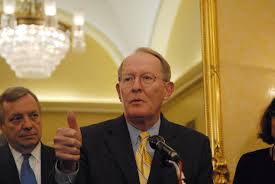
RadWaste Monitor Vol. 9 No. 9
Visit Archives | Return to Issue PDF
Visit Archives | Return to Issue PDF
RadWaste & Materials Monitor
Article 1 of 8
February 26, 2016
Alexander to Introduce Waste Interim Storage Legislation

U.S. Sen. Lamar Alexander (R-Tenn.) said Wednesday that he will champion a change in law that would allow the Department of Energy to contract private companies in storing nuclear waste.
The move would clear the way for DOE’s search for consent-based interim…
Partner Content